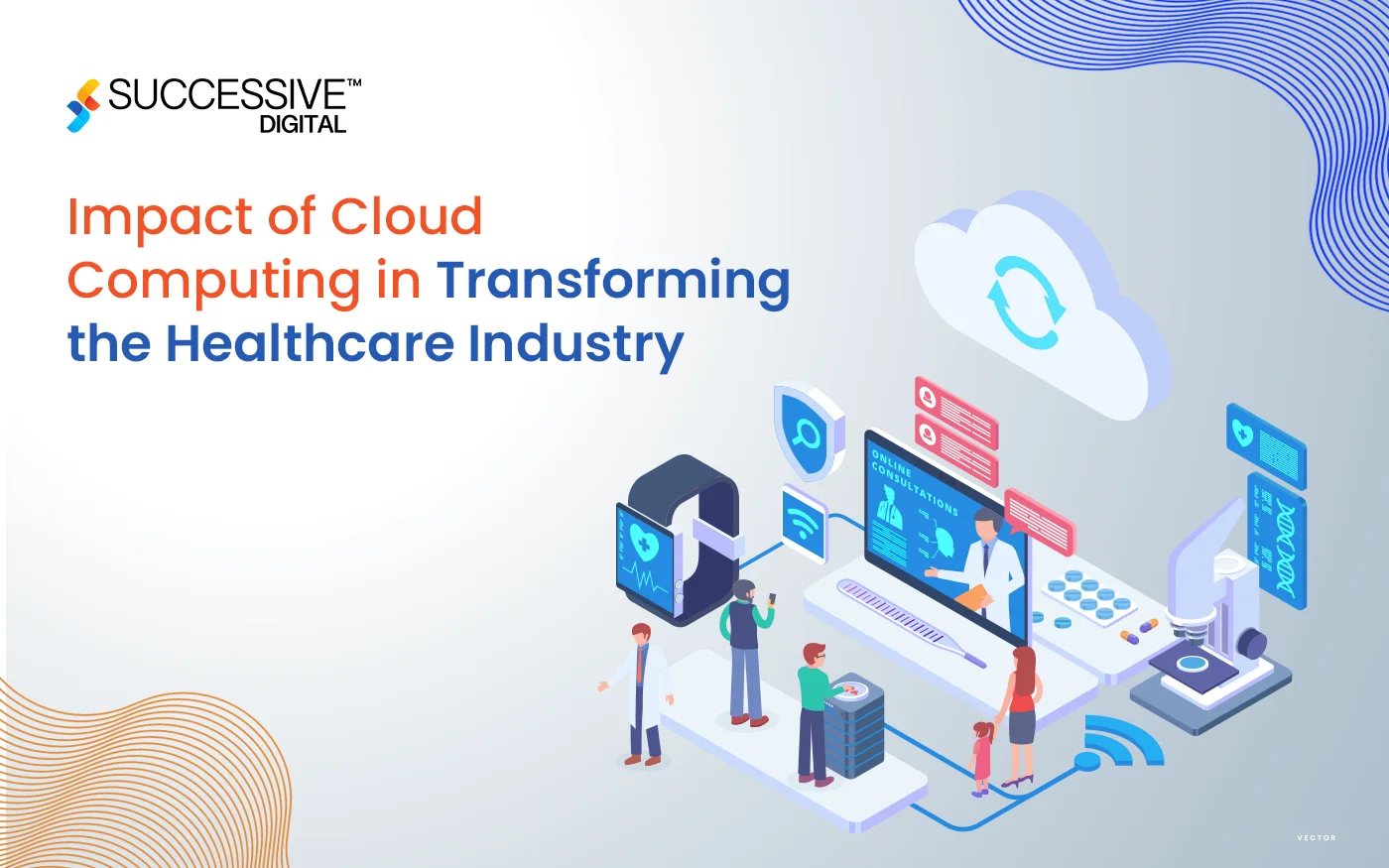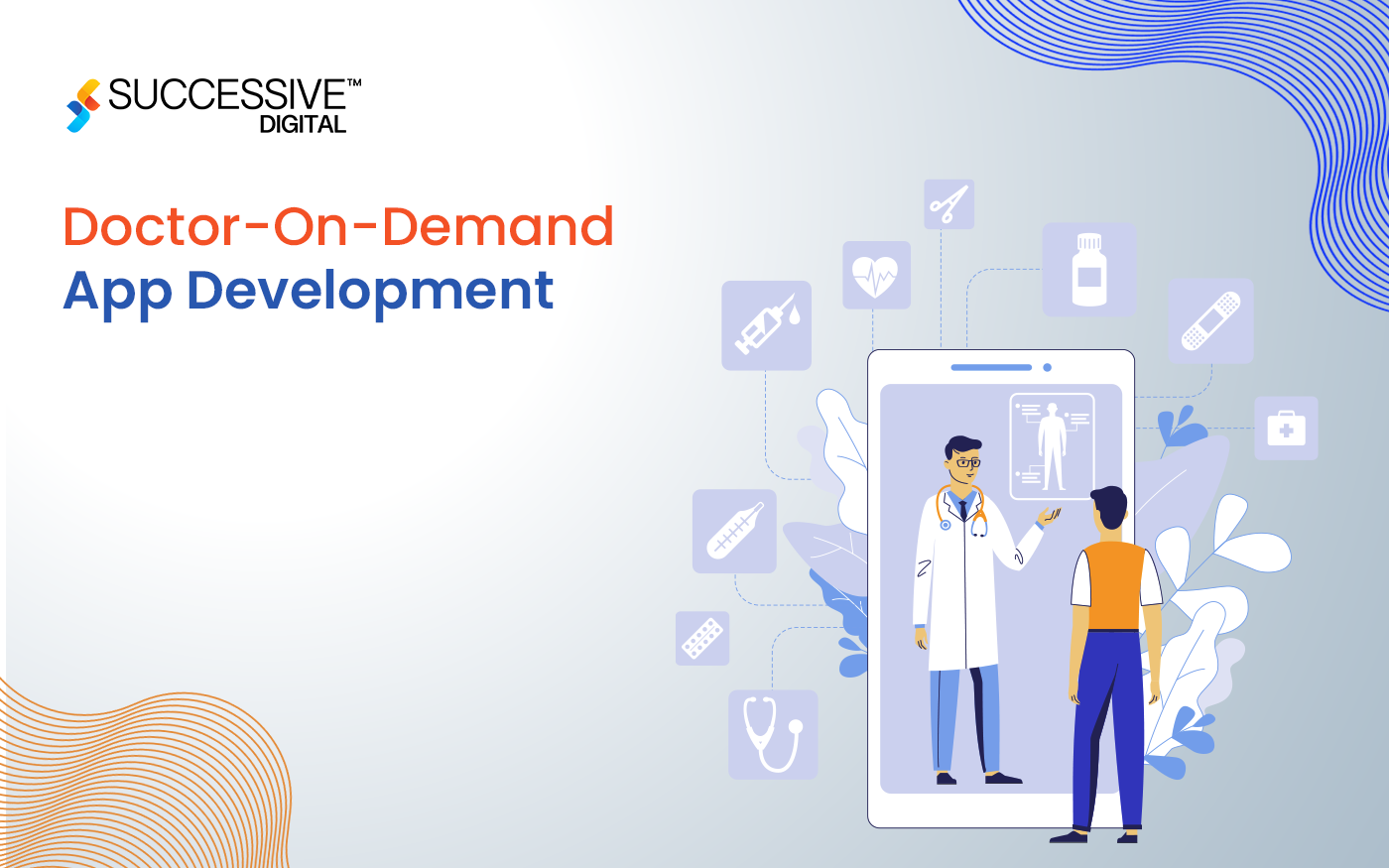Table of Content
- Healthtech Market Overview
- Benefits of Developing Healthcare Mobile Applications
- Types of Healthcare Applications
- Cost of App Development for Healthcare: Different Product Types
- Cost of Developing Basic Features of Healthcare/mHealth App
- How to Calculate the Healthcare Mobile App Development Cost?
- The Formula for Calculating Healthcare App Development Cost
- Bottom Line
- Frequently Asked Questions
Healthtech Market Overview
The revenue in the global mHealth market is estimated to be worth $119.5 billion by the end of 2023 and can potentially touch $400 billion by 2028. The digital health market is growing rapidly, with a CAGR of 27.0% from 2023 to 2028. This growth is backed by the penetration of smart devices and the use of digital health services as a convenient mode of healthcare by users globally.
The increased focus on improving personal health and fitness among the young generation and increased use of smart applications is expected to further accelerate the market growth in the near time.
Furthermore, the rising need for digital health services and remote patient monitoring are increasing parallel to the demand for mobile health apps, which is expected to fasten up the market growth in the future.
Benefits of Developing Healthcare Mobile Applications
- Improved patient experience
- Better access to care
- Enhanced efficiency
- Increased revenue
- Better data collection and analysis
The market is witnessing a surge in healthcare providers that are developing innovative and digitally advanced healthcare solutions which are competitive and cost-friendly. Many health tech companies are striving to launch advanced critical care and patient-centric digital solutions in the global healthcare landscape. However, there are uncertainties about how much it costs to develop a healthcare mobile application.
In this blog, we have gathered insights from our healthcare app development experts on the estimated cost of developing fully-fledged healthcare apps based on their usage. This blog will also give a deep understanding of the MVP features of different types of healthcare apps.
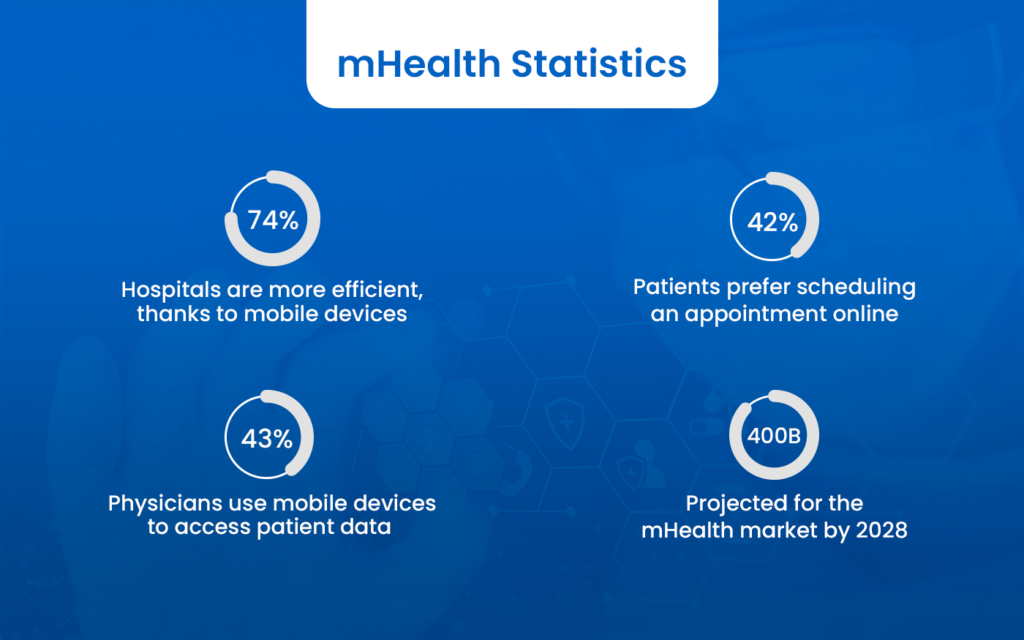
Types of Healthcare Applications
Research revealed that the COVID-19 pandemic had significantly expanded the digital health market, resulting in a global increase of app downloads by 60%. The steady rise in digital healthcare led to 55 thousand of healthcare and medical apps available on the Google play store. In contrast, the Apple app store has over 52 thousand apps offering digital health.
Healthcare apps can be split into three categories, patients, doctors, and healthcare facilities. Here are the potential types of healthcare apps falling into each category.
| Type of Healthcare Apps | ||
| For Patients | For Doctors | For Healthcare facilities |
| Medical Education Apps | Doctor Appointment Apps | Billing Apps |
| Reminder Apps | Electronic Medical/Health Records Apps | Pharmacy Management Apps |
| Healthy lifestyle apps | Medical Reference Apps | Physician Timesheet |
| Dieting Apps | Database Apps | Population Health Management App |
| Diagnosis Apps for Preventive Purposes | Health Tracking Apps | |
| Fitness Apps | Networking Apps | |
| Telemedicine Apps | ||
Cost of App Development for Healthcare: Different Product Types
Population across the globe is finding their comfort in getting access to top-notch medical care on their smartphones. Teleconferencing today is the most obvious manifestation of the digital trend, which is well-adapted by healthcare apps. The abundance of healthcare apps serves the four-fold goal of enhanced patient outcomes, improved patient experience, improved provider experience, and reduced cost.
Considering the benefits, here is a detailed explanation of the cost of healthcare app development for different product types.
Healthcare App Development Cost for Patients
Cost of Fitness App Development
The benefits of fitness apps are undeniable. The right fitness app can help as a virtual personal trainer or a potential training partner that can keep users motivated and accountable throughout the workout session. A fitness app has several features mentioned below and is a great way to help users with consistent training.
Features
- Activity tracker
- Self-care and mindfulness options
- Personalized training
- Multi option logins
- Direct messaging
- Notifications
The cost of developing a fitness app depends entirely on the functionality and complexity of the project. Usually, developing a fitness app with basic features can range from $10,000 to $50,000 or more.
Dieting App Development Cost
People these days are concerned about their health more than ever. They want quick and real-time health assessments. This led to an increase in the adoption of dieting apps. Nutrition planners or diet tracking apps usually utilize and create diets based on the data entered by the users on a regular basis.
Features
- Diet planner
- Alerts and notifications
- Wearable device integration
- Reports and analytics
- User dashboard
The cost of creating a basic MVP of a nutrition planner may cost between $30,000 to $60,000. A basic app usually includes the most basic features, such as a user dashboard, log creation, and a simple admin dashboard. Whereas a medium complex app with high functionality will cost between $55,000 – $131,000.
Wellness App Development Cost
Stress factor is increasing among many people due to the unlimited screen time and the daily rigmarole. Wellness apps offer mindfulness practices that can help us increase our ability to regulate emotions and decrease stress and anxiety.
Features
- Sleep tracker
- Meditation
- Fitness & productivity
- Gamification
A wellness app development usually costs between $30,000 to $100,000 to build. The cost of wellness healthcare app development relies entirely on basic and advanced features.
Telemedicine App Development Cost
Telehealth and remote patient monitoring are becoming the center of digital diagnostic care, while telemedicine is eliminating the distance between the doctor and patient. Telemedicine works best where distance is a critical factor by enhancing the delivery of healthcare services,
Features
- Patient registration
- Dedicated dashboards for patients
- Appointment scheduler
- Video consultation availability
- EHR
- Geolocation
- Payment gateway
A telemedicine app development cost can range between $40,000 to $75,00 depending on the functionality and other features.
Also read – What is Telemedicine and Why Is It Important?
Healthcare App Development Cost for Physicians
1. Database App or EHRs Development Cost
Healthcare databases are made to monitor and improve the value of healthcare services and provide actionable insights to physicians. These apps work on predictive analysis and make medical information accessible to the appropriateness, effectiveness, and quality of healthcare services.
Features
- Demographic data insights
- Administrative data
- Health risks and health status
- Past medical records of patients
A database app development for health care delivery can cost between $30000 to $50,000.
2. Cost of Medical Networking App
Amid the rising instances of physician burnout due to uneven distribution of care delivery, medical networking apps increase peer-to-peer communication between healthcare professionals. This way, physicians can utilize medical networking apps by using real-time data processing.
Features
- Forum
- News
- Journals
- Guidelines
- Social networking
- Case studies
Building a medical networking cost can cost between $30,000 to $60,000 based on the features and functionality.
3. Cost of Billing App
Billing apps are a great way to manage payments and medical bills. These applications allow hospitals to maintain virtual receipts for smooth and simplified transactions.
Features
- Custom bill generation
- Automated billing
- Discount adjustment
- Audit support
- Credit billings
The cost of developing a fully-functional healthcare billing app may fall between $40,000 to $90,000.
4. ePrescription (eRx) App
Digital prescription has the potential to disrupt the digital healthcare industry with its app architecture. These apps enable healthcare institutions to share patient prescriptions with pharmacies and physicians when needed directly.
Features
- Integrated drug database
- Extensive information viewability
- Patient-specific reports
- Customized interfaces
The cost of ePrescription app development entirely depends on the complexity of the project and the number of features Usually, creating a digital prescription app with basic features can range from $40,000 to $80,000 or more.
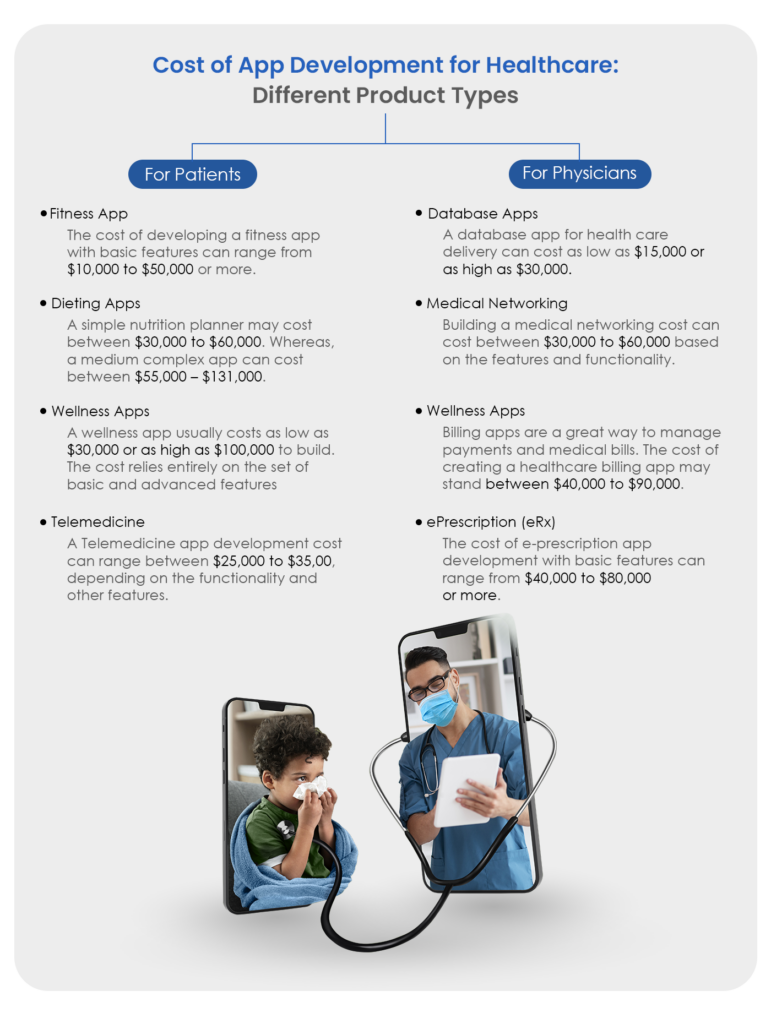
Cost of Developing Basic Features of Healthcare/mHealth App
Medical mobile app development costs can vary, depending on the specific features and required functionality. Here are some of the features based on costs. Adding these features can help the medical app attract and retain the correct set of features.
User Registration and Login Process
User registration or single sign-on is a must-have feature for digital healthcare app development. This feature gives users access to a lot of social media and email websites and user information, which is further required for user retention.
The cost of developing a user registration login feature for the healthcare app may cost from $4,000 to $10,000.
User Accounts/Profiles
User account/profile is an important feature for healthcare app development as it provides a way for users to create a personalized experience within the app. Interactive user profiles are filled with relevant information about the user’s vitals and previous medical records. Users can save preferences, settings, and information specific to them by accessing their profiles.
Designing and developing interactive user accounts and profiles may cost between $10,000 to $15,000.
Push Notifications
Push notifications for the healthcare app allow healthcare providers to send real-time messages to patients regarding their health status, medication reminders, test results, or appointment reminders. This can help improve patient engagement and adherence to their treatment plan.
The cost of developing push notifications falls between $800 to $1,500.
Payment Gates
With the digitization of healthcare services, creating safe and secure payment options has become essential. Healthcare apps provide patients with the convenience of scheduling appointments, receiving medical advice, and accessing medical records from their mobile devices or computers. Integrating the payment gates to these apps allows patients to pay for their services online without the need for physical transactions. Smooth monetization of services is important for any business. Payment gateway plays a crucial role in ensuring the lucrative accomplishment of transactions.
Creating the payment gates can cost between $3000 to $7000, along with the integration of multiple payment gateways to the application.
Messaging System
Messaging systems help healthcare providers to manage patient expectations and improve patient engagement. Patients can receive reminders about appointments, medications, and tests and can easily access their medical records and test results through the messaging system. This can help to increase patient satisfaction and improve patient outcomes.
Developing a fully-functional in-app messaging feature can cost anywhere between $5,000 to $10,000
How to Calculate the Healthcare Mobile App Development Cost?
The cost of developing the healthcare app depends on various factors such as platform type, app maintenance, hourly rates, UX/UI design, and hourly rates of the developers. Here, we’ll break down each point and closely examine how they contribute to the healthcare application development cost.
1. Platform Type
Healthcare apps are built using the frameworks developed separately for iOS and Android platforms. Other than this, the apps can be built on hybrid app development techniques and web technologies for development with the native shell. The hybrid apps work by adding an extra layer between the target platform and the source code. As a result, hybrid apps may perform slightly slower than native or web versions of the same healthcare application.
The cost of building the cost of developing the mobile healthcare app depends on the platform types. For instance, the hybrid healthcare app can cost up to $600,000. For creating a native app, the cost can be up to $400,000.
2. App Maintenance & Support
The medical mobile app development cost depends largely on app maintenance and support services as well. For ongoing maintenance, the cost can range from $1,000 to $10,000 per month, depending on the complexity of the application and the size of the development team required to provide the support. At the same time, the cost can vary widely depending on the scope and complexity of the updates needed. Small updates, such as bug fixes and minor feature additions, can cost as little as $500 to $1,000, while more extensive updates that require significant development time and resources can cost tens of thousands of dollars.
3. UX/UI Design
The look and feel of the application are major factors contributing to the estimated cost of the healthcare app development.
Healthcare apps have a huge target audience of all age groups. Considering the requirements of the target persona, the most appealing UX/UI functionality with simple navigation and subtle colors will estimate the final cost.
4. Compliance and Regulation
The cost of developing the mobile healthcare app is highly influenced by compliance and regulatory requirements. Adherence to this compliance ensures the safety of patient data.
These standards provide safety for patients against any unlawful medical practices. The key factors and their security standards must be considered while estimating the healthcare application development cost.
- Data protection and privacy: Due to rising cases of data breaches and security threats, digital healthcare apps must ensure that user data is protected, encrypted, and not shared with third parties without the user’s explicit consent. Apps must comply with laws and regulations related to data protection and privacy, such as the General Data Protection Regulation (GDPR) and the Health Insurance Portability and Accountability Act (HIPAA).
- Medical device regulations: Healthcare apps involving pharmaceuticals must comply with regulatory bodies such as Food and Drug Administration (FDA). The FDA provides guidance for Healthcare mobile app developers that fall under the category of medical devices.
- Ethical considerations: World Health Organization (WHO) and the International Medical Informatics Association (IMIA) issue some ethical standards and guidelines for mobile app developers to follow while developing healthcare applications. These set of practices disable the promotion of harmful practices and incorrect or misleading information.
- Advertising and marketing: Healthcare apps must comply with regulations related to advertising and marketing. Developers should ensure their apps do not make false claims or promote unproven treatments or therapies.
5. Hourly Rates
The hourly rate of a healthcare app development team depends on various factors such as their location, experience, and skillset. For instance, developers in countries with a high cost of living, such as the United States and the United Kingdom, typically charge higher hourly rates than developers in countries with a lower cost of living.
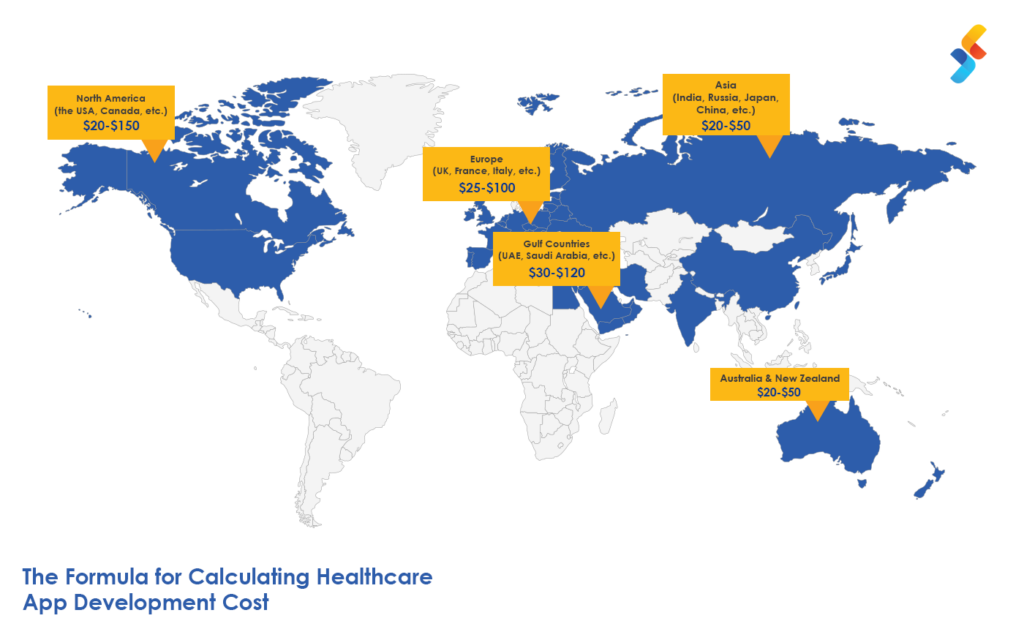
| Region | Hourly Costs |
| North America
(the USA, Canada, etc.) |
$80-$150 |
| Europe
(UK, France, Italy, etc.) |
$45-$100 |
| Gulf Countries
(UAE, Saudi Arabia, etc.) |
$30-$120 |
| Asia
(India, Russia, Japan, China, etc.) |
$20-$50 |
| Australia & New Zealand | $35-$150 |
The Formula for Calculating Healthcare App Development Cost
Final Cost of Healthcare app= No. of Development Hours x Hourly Rates
Bottom Line
Digital healthcare apps are flourishing with the need for improved usability and enhanced health outcomes. Creative health applications that serve the right target groups result from much forethought, investigation, and careful consideration starting from the initial stage of development. Working with a healthcare app development company is essential for cutting-edge healthcare applications. Successive Digital is a top-tier mobile app development company that is helping businesses reach the paramount with our top-notch services. Get in touch with our experts and get your estimation for healthcare application development cost today.
Frequently Asked Questions
The cost of developing a healthcare app can be as per the technology used, the app’s functionality, design, and post-launch support. The basic cost of healthcare app development can range between $50,000 to $100,000. A more complex app with more functionalities can cost up to $350,000 or more.
Complying with set standards and regulation of healthcare guidelines ensures that the app meets strict data privacy, security, user experience, performance, and scalability criteria.
Keeping the cost under your budget is really easy. If you hire a full-cycle mobile app development company, they will guide you on keeping the costs under control right from the discovery phase.










